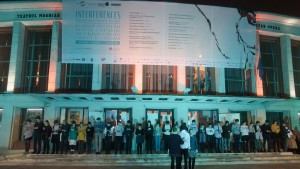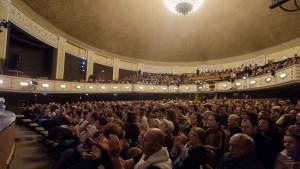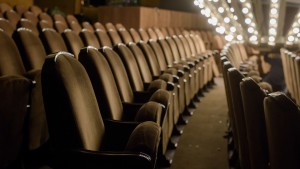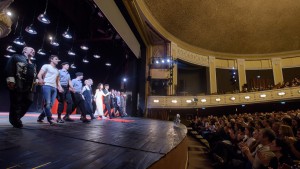Festivals As States Of Culture Within Nation States
From 24 November 4 to December in Cluj (Romania) the fifth edition of the Interferences International Theatre Festival took place. “OOOO – The Dream Of Gogol” (based on “Nevsky Prospect”, “Marriage”, “Ivan Fiodorovich Shponka and his Aunt” and “Diary of a Madman” by Nikolai Vasilievich Gogol, written and directed by Margarita Mladenova and Ivan Dobchev) by the Sfumato Theatre Laboratory (Bulgaria) was one of the 22 performances, coming from 14 different countries in 13 languages, all of which constituted the rich programme of the event. That was the second participation of the troupe in the ten-year history of the festival, following their visit with “Jean, Julie and Kristine” (after “Miss Julie” by August Strindberg, directed by Margarita Mladenova) in 2012. The Sfumato, UTE member since 2011, is a theatre-laboratory, aiming at in-depth theatrical research through long-term programmes, masterclasses, workshops and parallel programmes.
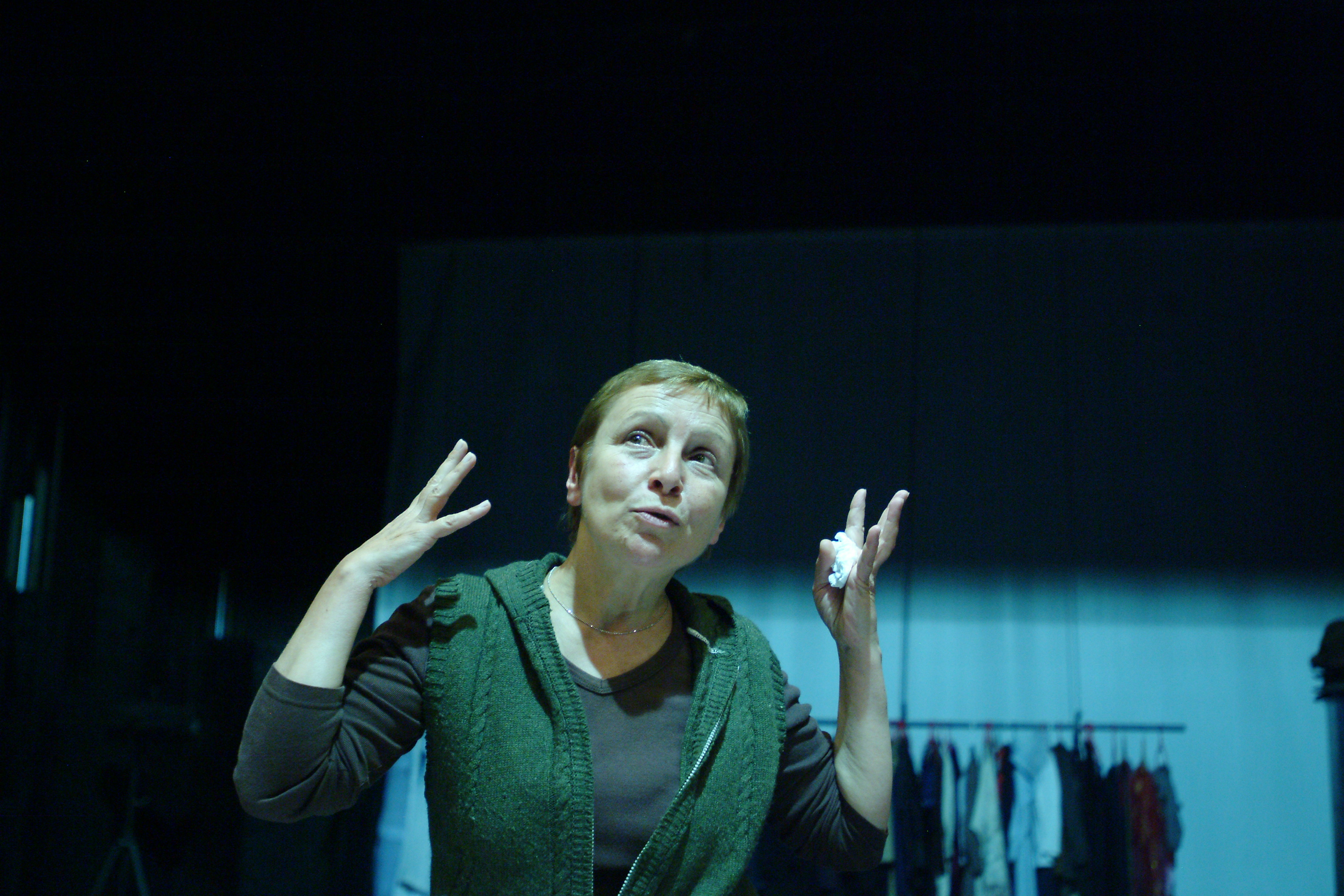
Prof. Margarita Mladenova, a theatre director and a cofounder of the Sfumato (together with Prof. Ivan Dobchev), tells us more about her immediate impressions of the festival from the perspective of a participant in two of its editions; the role and the meaning of festivals in the contemporary cultural situation; and the place of festivals in the own artistic perceptions of the troupe:
The Sfumato Theatre Laboratory regularly participates in festivals worldwide. In your opinion, what is the role of festivals in our current cultural and theatrical context and where on this map would you place the Interferences International Theatre Festival?
The Sfumato is a festival theatre. Not because we deliberately create works meant exclusively for festivals, but because, especially in our contemporary context, festivals are those cultural and artistic spaces that are interested in the quest for a more unusual language, innovative methodologies, creative techniques and processes. They are “states of culture within nation states”, which insist that theatre as a living form of art should remain a form of art.
For us, Interferences is one of the major theatre festivals in this part of Europe. We have long-term contacts and partnerships with about forty festivals. We have participated at many of them several times — in Avignon (France), Essen (Germany) and Nancy (France), for instance. We have been to Japan, Korea, and we have visited festivals in Central Europe many times. But for Ivan Dobchev and me, and for our actors, the participation at the Interferences Festival brings a sense of completeness and satisfaction due to the high levels of consideration, implementation, nurture and accomplishment of this festival space. Beginning with the minor details, through the team and it’s the attendance to the forums envisioned in the programme — I have in mind the follow-up meetings and the discussion instead of simply showing the performances. And the audiences; because this festival has one very thoughtful and knowledgeable audience, which has been nurtured. All encounters with them seem to me as if one were attending a music concert, where everyone in the audience knows the notes and the scores.
For example, we had a very powerful discussion after our performances. And there we talked about how different “OOOO – The Dream Of Gogol” is from “Jean, Julie and Kristine”. The spectators were able not only to distinguish them, but also to reason on those differences in an analytical and artistic perspective. That means that there we encounter a developed, watchful and sensitive gaze, echoing our own processes and intentions. For us this is significant in terms of having a future instead of simply having a full house, a nice performance, applause, and then return home. The real effect, the efficiency of those meetings, goes beyond our stay there.
And is there something that can make the whole experience even more fruitful?
There is one wish of the troupes that is always present when they are invited to a festival: to have the chance to stay longer than the time needed for their participation in order to be able to see other performances of the programme and to meet with colleagues. Fundamentally, this is in the meaning of festivals: for artists to gather in the first place, and to sojourn in a community. But, particularly since 2010 and since the enforcement of the logic that the performance needs to be placed as a commodity on the market, this notion has changed its pathos. Now festivals are more for the audiences than for artistic encounters. Yet, in my opinion, theatre should not give up on this. It is exactly in this situation that festivals need to want and quest for possibilities to open up spaces for artistic collaborations. Because there is no other place where artists can meet other artists outside these special festival territories. We have discussed that with the Interferences Theatre Festival’s organizers and this is their will, too; but the limitations are many.
However it is through those reverberations among us that the system opens up and chain reactions and theatrical collaborations occur. And they can become as a relay through time. Some things might end, and some might last or bring into the world their natural continuations. And when we, the theatre makers, have this way of thinking and need, no one can avert us from gathering together in such communities.
Look at UTE masterclasses, for example. We send interesting young people, open to learning through experience. Since 2011, when the Sfumato became a member, up till now we have sent more than ten participants. Two of them, who attended Lev Dodin’s masterclass in Saint Petersburg, met other people there and together they decided to form the ISO Theatre in the frame of the UTE that is now striving to create its own, permanent existence.
Etymologically speaking, “festival” derives from the Latin “fēstīvus”, meaning festive, merry, joyful. We know that ancient theatre is also tightly related to the feast, the ecstatic, the interruption of the everyday, linear time and opening up space for vertical connection with the transcendental. In this sense a theatre festival has to multiply the festivity, to make it a feast of the feast within the feast. Is that what contemporary theatre festivals do?
This is the pathos of every festival and it remains there. No matter what its priorities, themes, own pain and subject of curiosity of the given edition are. Theatre itself, the nature of the encounter, occurs in a greater reality; on the borderline between truth as “we all know it”, as a daily routine, and the extraordinary, the exceptional, the festive, the complete existence of art. The two are merged together intensively and not at all mechanically, but exactly through this edge, where the performance itself exists as a greater reality.
And the polygon that appears as a result of adding together all the “edges” of the performances, included in the festival’s programme—
—lifts up this entire existence vertically and does not conform to the horizontality of daily life. It is extraordinary.
Earlier you mentioned festival audiences. In this logic, they are different than the ones regularly entering the building where a troupe performs and where the performance is created. In that sense, the chance of meeting with them is singular. Does that intensify this encounter, and how does it alter it?
A festival participation, with its specific presence, voltage and concentration, makes the troupe and the whole crew hungry and long for a higher encounter. That is also valid for the audience, seeing a performance that cannot be seen outside of the festival’s programme. This singularity of the encounter gives it exceptionality and intensity. The festival performances are always more inspired.
Even though when I say “more” and I begin to think about how in the Sfumato, for the tenth year now, two of our performances of the “Strindberg” programme — “Jean, Julie and Kristine” and “Dance of Death” — that have been all around the world, are still on stage. They have had extremely powerful vertical motions in their encounters with audiences. And they have preserved that spirit. The performance absorbs, creates memory of exceptionality, which is later stored and reenacted; because, in principle, every single night the encounter with the audience is an exceptional experience; for the performance, and for the spectators. This is how we should think of it. The other is inertia.
And this exceptionality, transitory, and yet endurance; the live encounter with its high risk, vulnerability, but at the same time its resilience: the coexistence of all those entities is partly what makes each theatre performance a unique experience.
It begins now, it develops now and it happens again. It is fragile but at the same time it is vigorous. It fights for the higher encounter. In that sense festival participation accumulates and charges the performances not only with self-esteem, but also they generate energy that allows them to endure harder and harsher situations later on, for example, to handle more indifferent encounters.
We talked about what festival participations generate and add up. But is there something that gets lost and worn out?
Of course. The Sfumato Theatre has been travelling for thirty years now. And the encounter of the foreign spectators with our fervent performance is significantly more responsible and difficult, especially through the language barrier and the surtitles. The spectator’s perception is divided. He or she needs to read above what the actor is saying and at the same time to embark on a journey with the performance; to enter into it through his or her senses.
In our meetings with audiences throughout the world we have discussed that many times. It is a delight that there is a group of spectators who claim that — even if they do not know the text beforehand, as there are people who are familiar with the plays and the communication with them is much more straightforward — they just leave off reading the surtitles and enter into the performance. They take a look only when it is crucial and in context they understand. Senses tune to a level of expression that is above or underneath the linguistics, which is purely theatrical. This is where the encounter happens. And within it both sides mature. Language is not the only “track”. What is being said does not clarify what is being done. That happens through the energies, scores, choreography of living, gesture, which is also a text, movement, that is a text and a message.
And, if we are to bring this conversation back to the chronological notion of linear time, we have to admit that this extraordinary encounter with the audience happens for a limited number of hours. “OOOO – The Dream Of Gogol” had two performances at the Interferences International Theatre Festival in one day, each of them lasting about two hours. In this light, in order to take a look at festivals from a more practical perspective, could you tell us how much time, effort, travelling, preparation, etc. goes into it for everyone involved — from the actors to the technical crew?
I can answer that immediately. The participation took us four days. On the first day we left early in the morning and arrived late at night. The next day we began adapting the performance in the late afternoon until sometime late at night. On the day of the two performances we continued working on the adaptation. Those are the complex, uneasy, hidden from the sight of the spectators’ hours of adapting each part of the performance. Of course, everything is already arranged in a long correspondence on the technicalities beforehand. And yet, no matter the preliminary preparation, for everything to happen — to place the scenography in slightly different scales, to adapt everything, to involve the actors, to check the surtitles, and everything to match each other and the two performances to begin — takes time. Afterwards we had performances at 4 p.m. and at 10 p.m.
The next day we had a discussion at 10 a.m. We were back in the bus at noon and arrived in Sofia around midnight. It is challenging, but we love to travel. We have always wanted it to be that way. Our actors and our crew do not complain, no matter how heavy the journeys are. Actually there is this spirit of travelling, it is pleasing that we spend those hours together and can say unspoken words about the performance or something else. Other times they just play “word association” games, listen to music, and we stop wherever we want to. This is a continuation of our coexistence. And everyone who is involved in theatre is prepared for this.
The nomadic code of living is fundamentally inherent to theatre. Many theatres nowadays have settled and do it rarely. And when they do it, it is difficult for them. Whereas we have adopted this model from the very start. When we created the Sfumato as a theatre laboratory, questing for new expressions and contents, we very much wanted not to “look down” on our feet but to be able to verify our quests through encounters; through formats such as the workshops. They precede all our bigger processes and are a basic model of the Sfumato’s existence. And when we have a work as a result of that, we want to test it through demanding festival participation or responsible tours, in front of other audiences and measures.
We insisted to be like this from the very start and that is the reason why since the beginning we have organized the “Sfumato Reviews”. There we invite our partners to come to Sofia. They come and see what we do and invite us. We go, and other festival curators see our performances there, and later invite us. When we attended the festival in Avignon (France) with “The Black Fleece” (author’s performance, co-directed with Ivan Dobchev and created as part of “Archetypes” programme, 1997 –2000), for example, Shizuoka Performing Arts Center (Japan) had sent their curators. They saw the performance and immediately after it ended invited us to their festival.
And this is the most natural and unyielding way that things work. That is why we organize these formats, where someone who is curious about the Sfumato’s work can come and see it. We prefer not to rely on recorded performances, because they cannot substitute the live gaze and the live encounter. And this live experience is there and will continue to be there. And the Sfumato will exist as long as the live experience exists. If, for any reason, we settled down and embraced the existence of a theatre that simply struggles to survive, the Sfumato will become extinct.
Published on 21 December 2016 (Article originally written in Bulgarian)
